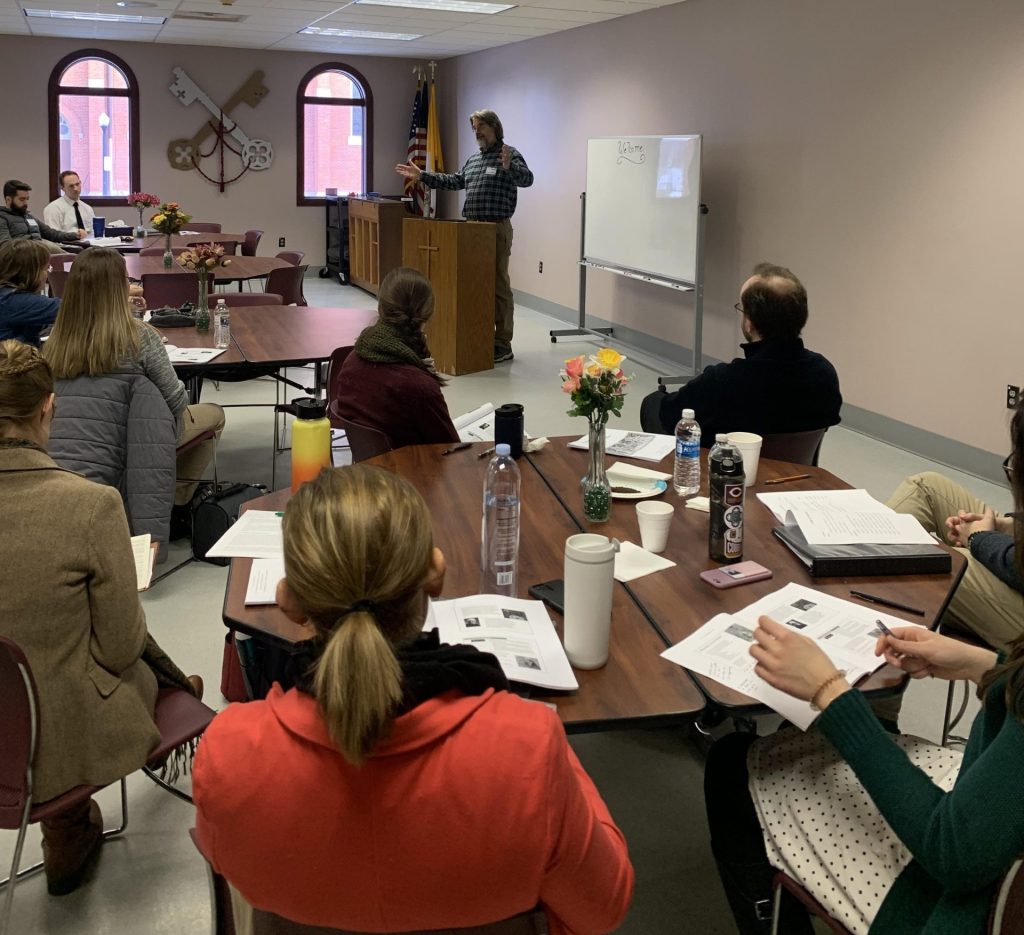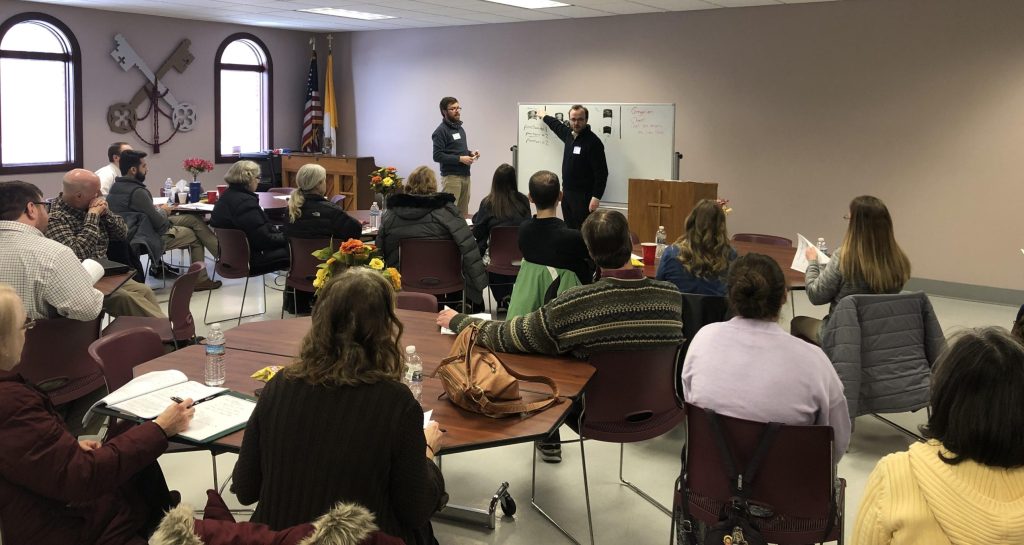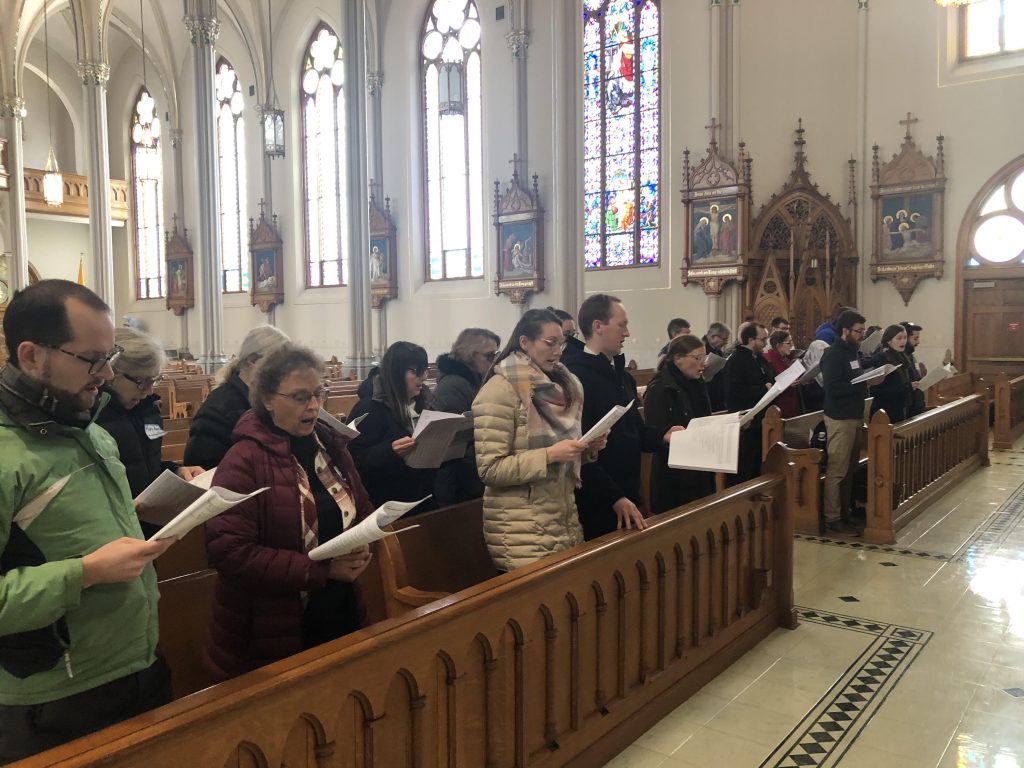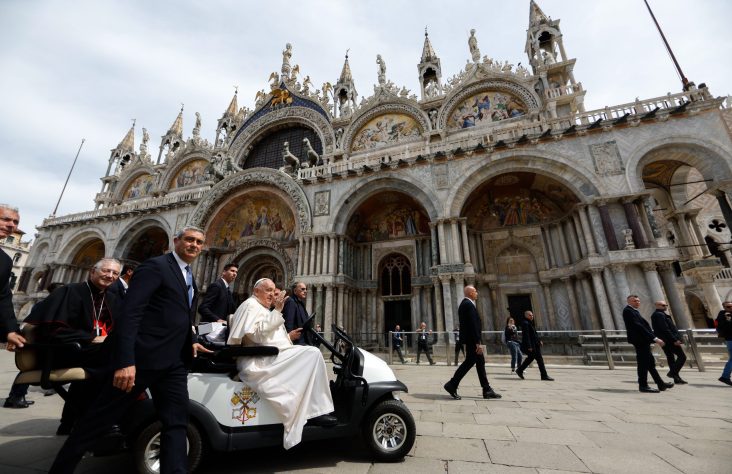February 16, 2023 // Diocese
Workshops Help Diocesan Music Leaders Incorporate Eucharistic Beauty and Authenticity Into Liturgical Events
One of the primary themes of the National Eucharistic Revival recalls the transformative power of the Lord emphasized in the Book of Revelation: “Behold, I make all things new!”
As the dioceses and parishes seek to lead parishioners into greater knowledge and love for Jesus in the Eucharist during this special time, a significant focus will be on introducing aspects of prayer aimed at kindling new sparks of divine love in the hearts of the faithful. Bishop Rhoades, in both his Eucharistic-themed formation days and his messages to parishes, has asked to bring about a renewed sense of devotion within liturgies specifically by focusing on the importance of sacred music.
To aid with this endeavor, the newly created Saint Hildegard Project, based in South Bend, has offered to host workshops to train and advise parish music leaders to more deeply incorporate Eucharistic beauty and authenticity into their liturgical events.
Their first diocesan music workshop took place on Saturday, Jan. 28, at St. Peter Catholic Church in Fort Wayne. The next will take place on Saturday, Feb. 25, at St. Monica Catholic Church in Mishawaka.
Addressing music leaders at their first event, Jerome Cole, Founder and Leader of the Saint Hildegard Project, emphasized that their main hope is “to learn to love God more deeply through whatever we do, especially through music at Mass where Jesus is present in the Eucharist.” Their focus involved a thorough, yet engaging study of what the Church has said about liturgical music and how to more deeply tap into the rich treasury of graces it offers.

Sara Cole
Ellen Friesen, alto and member of the Saint Hildegard Project, presents a talk on “Eucharistic Hymnody at the Service of the Church” at the diocesan music workshop at St. Peter Catholic Church in Fort Wayne on Jan. 28 to help musicians and directors better identify and teach music that is Eucharistic from an authentically Catholic perspective.
Ellen Friesen, a parishioner of St. Joseph, Mishawaka, presented on the importance of using hymns within the liturgy which clearly express the Catholic doctrine of the Eucharist. Based upon the United States Conference of Catholic Bishops’ (USCCB) “Eucharistic Hymnody at the Service of the Church,” a document written in part by Bishop Rhoades, Friesen explained how music is tremendously formative and personal to people’s experiences of worship. She reminded that in order to guide liturgical prayer, it is essential to employ hymns that teach, catechize, and lift the soul to God in ways consistent with orthodox Catholic theology. She asked, “Do our hymns focus on the realities which have taken place before us, that there is no longer bread and wine but truly Jesus’ Body and Blood present on the altar? Does the hymn employ language of Scripture to describe and praise the Eucharist? Does it model a disposition of wonder and reverence towards the Eucharist? Does it place its singers in a posture of prayer, focusing more on God and who He is, what He has done and will do, rather than what I can do? When selecting hymns to be used at Mass, remember that they help us to pray when we are preparing for communion or have just received Him or when we don’t have the words ourselves. They aid in fostering personal relationship and devotion. Our authentically full, conscious, and active participation is most often guided by Church music!”

Sara Cole
Dr. David Fagerberg, Professor Emeritus of Liturgical Studies at the University of Notre Dame, gives a Eucharistic-themed lecture to attendees at the Diocesan Music Workshop at St. Peter Catholic Church in Fort Wayne on Jan. 28.
The event included a talk by Dr. David Fagerberg, Professor Emeritus of Theology at the University of Notre Dame, who specializes in liturgical studies and unpacking the realities behind how prayer is the foundation of belief (lex orandi, lex credendi). An ardent fan and scholar of both C.S. Lewis and G.K. Chesterton, Fagerberg opened with a line from the Chronicles of Narnia to invite deeper self-reflection, stating, “Aslan (the mighty lion who represents God) says to Lucy, ‘every year you grow, you will find me bigger.’ Now, we must all grow older, but do we notice that God has become bigger? If not, we should evaluate our spiritual growth. We should find the Eucharist bigger each year too! What needs to grow — and be revived — is us, not Him.”
Leading the participants through a liturgical retreat, Fagerberg provided five dimensions of the Eucharist, presented as five facets of a diamond containing ‘inexhaustible richness’, focusing on the Eucharist as: thanksgiving, fellowship, memorial, sacrifice, and mystic participation. He also emphasized the reality that the traditional vices which plague humanity detract from the ability to worship well. “Selfishness makes thanksgiving difficult to do; we grow in (spiritual) size in proportion to our charity. Remember that the devil is the creature who does not love, whereas the identity of the Christian was seen in their love for one another. Religion is an act of justice, to give God His due: our worship. Christ is the only one who gave God everything, therefore our sacrifice is perfect when we offer ‘in, with, and through Him.’ To do so requires reproducing in ourselves His charity, life, and mercy. We must help bring people to have strength in Christ, without being vain about it. Wouldn’t it be one of the worst things to have someone in the choir who seeks to draw attention to themselves rather than God? For the Eucharist to appear bigger, we must deny ourselves and seek Christ together with the Church in a humble action of thankfulness. Therefore, the success of the Eucharistic Revival will depend upon humility. Pride is anti-liturgy; it is the absence of humility. The foundational work of liturgy requires stepping outside of ourselves, to authentically receive the salvation God offers, remembering that God became man so that man might be made divine, and share in His life forever.”
Brian MacMichael, Director of the Diocesan Office of Worship, explained that during the upcoming “parish year” of the Eucharistic Revival, Bishop Rhoades has asked each parish to host 40 Hours Devotion of Solemn Exposition of the Blessed Sacrament, concluding with praying Vespers (Evening Prayer) of the Blessed Sacrament.
For this reason, members of the Saint Hildegard Project led participants in practicing Gregorian Chant, in learning the structure of the Liturgy of the Hours, and singing the Vespers of Corpus Christi together.

Christopher Lushis
Jonathan Wheeler and Daniel Tucker teach fundamental elements of Gregorian chant to those in attendance at the Diocesan Music Workshop at St. Peter Catholic Church in Fort Wayne on Jan. 28.
Jonathan Wheeler, parishioner at St. Matthew Cathedral explained, “The Liturgy of the Hours is the prayer of the bride to the bridegroom, of the Church to Christ. The psalms were the liturgical prayer book of Israel, prayed by Christ to His Father. He fulfilled them in His own life and He models that they must remain central in the life of every Christian. They reflect the gift Christ has given; what it means to love Christ and love as Christ. Even if we know the psalms, we can always find new depth and meaning from praying them. To pray these psalms throughout one’s day is to join in the praises, the blessings, the cries amidst suffering, the intersection of harmony of all of God’s creations again and again, so as to form the very heart of prayer of the Church, through the rhythms and melodies of Sacred Scripture, and be formed personally into that love slowly over time.”

Christopher Lushis
Jonathan Wheeler, tenor and member of the Saint Hildegard Project, practices styles of chant with those in attendance at the Diocesan Music Workshop at St. Peter Catholic Church in Fort Wayne on Jan. 28.
MacMichael expressed his gratitude to the Saint Hildegard Project for their efforts to guide parish leaders into stronger Eucharistic devotion. “I am very grateful for their help as it is a great assist in the work of sacred music. As Jerome said at the beginning, it is all about loving Jesus more, expressing it through the liturgy, and trying to do it according to the mind of the Church. I am personally grateful in so many ways for the music directors from the parishes who came here and for what they do at the parishes. There are a lot of sacrifices that are made of time and I am thankful for the talent they put in, as well as for being open to learning and always seeking to become better. Everyone here, regardless of how well they know the liturgy, can always learn something. I am thankful for such beautiful resources from the Theology Department at Notre Dame and these music directors who are both skilled in music and have theological training. We are so blessed to have a critical mass of this talent who desire to share it with their colleagues. I hope it is the start of something really robust in this way! It’s a blessing for the diocese.”
Richard Kochel, Director of Music Ministries at St. Jude Catholic Church in Fort Wayne, shared that this event emphasized “connecting back to your roots and praying like a Catholic through sung prayer.” He explained, “We are used to the Mass, but many of the faithful are not used to praying the Liturgy of the Hours. Praying the Psalms is part of our tradition too and has its roots of Judaism. Praying this together will help us to better engage in our faith and celebrate it, because singing is celebrating what we believe.”

Christopher Lushis
Participants in attendance at the Diocesan Music Workshop at St. Peter Catholic Church in Fort Wayne on Jan. 28 chant Vespers of Corpus Christi.
Registration and details for the next workshop in Mishawka can be accessed at diocesefwsb.org/worship.
The best news. Delivered to your inbox.
Subscribe to our mailing list today.






